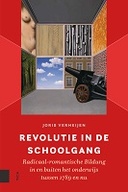Explore

Decades of neoliberal efficiency thinking have turned education into a straight, results-oriented school corridor and closed off the space for alternatives. Can the German ideal
of free self-formation, or Bildung, change that? This book provides the answer, but it also practices thinking in alternatives by digging up another, forgotten Bildung tradition and rewriting the history of German Romanticism.
Joris Verheijen shows that at the same time as the conservative Bildung philosophy of Johann Wolfgang von Goethe and Wilhelm von Humboldt, a radical-romantic Bildung emerged, which, according to Georg Forster, Caroline Böhmer and Friedrich Schlegel, called for drastic social changes. Their revolutionary ideas, however, have been suppressed and erased from cultural memory. It is precisely from these radical romantics that we can learn today how a truly critical thinking can ignite in and about our schools, how writing instruction can be freed from the straitjacket of linear assignments and how students can form themselves, instead of being deformed.
This book is included in DOAB.
Why read this book? Have your say.
You must be logged in to comment.
